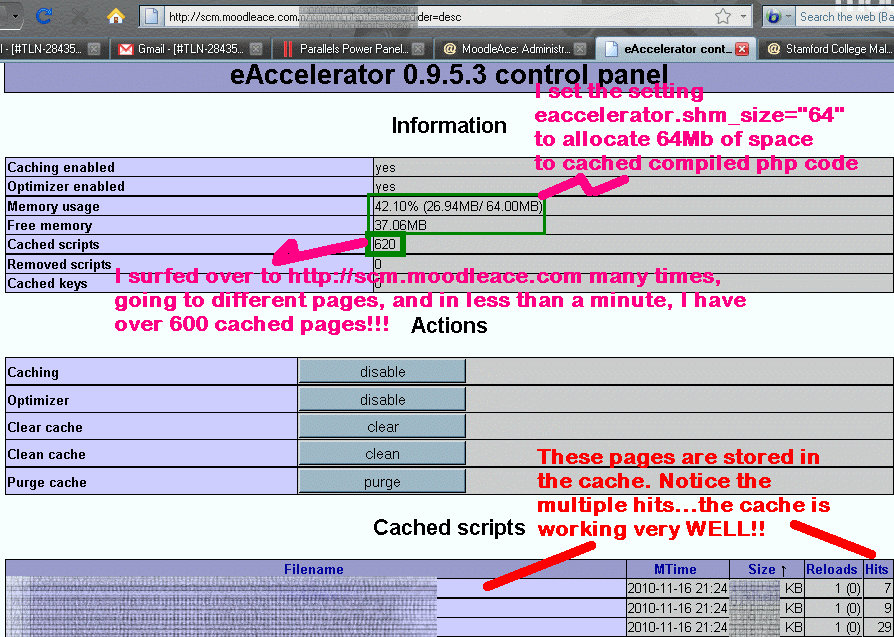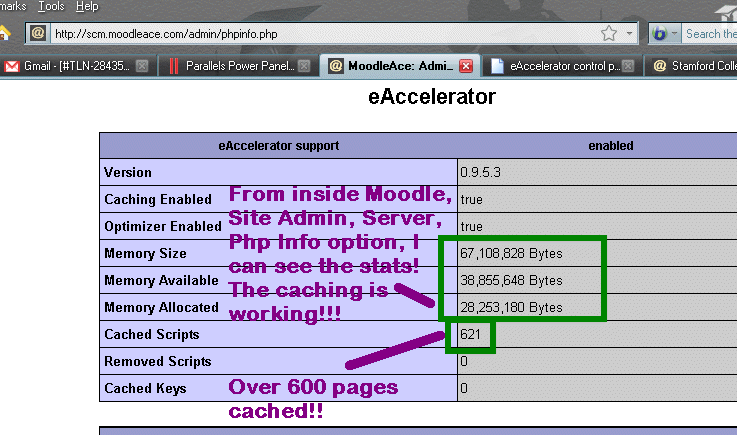BUT WAIT...THERE'S MORE!!!
To speed up your website, you'll ALSO want to enable Php caching (also known as Php Acceleration).
I only have experience with Eaccelerator and not with the APC. I'm sure many others have nothing but praise for BOTH software in increasing their page loading times.
I setup eaccelerator with these definitive guides. These links have helped me to set up eAccelerator on my 512Mb RAM Linux (Centos 5) Virtual Private Server !!!!!
http://www.theadminzone.com/forums/showthread.php?t=8152
-and-
http://eaccelerator.net/wiki/InstallFromSource
-and-
http://www.php.ph/2007/12/21/centos-5-eaccelerator-installation/
-and-
http://moodle.org/mod/forum/discuss.php?d=164199
But following the instructions, I discovered that that my pages still wouldn't cache. See my plight in http://moodle.org/mod/forum/discuss.php?d=166284
So in desperation, I contacted my Web Host and they gave me some clues. I then surfed somewhere where the webpage mentioned that "eAccelerator only works with mod_php or php in fastcgi mode. It can't be used in cgi or cli because eAccelerator needs to set up shared memory, and this can only be done when all php instances that need to access it are forks of the first process."
Aha! The game's afoot! So with guidance from my web host, I setup my Plesk Panel so that php would run not as cgi, but rather as fast-cgi!!! THEN to my amazement and wonder, my pages actually started to cache. Not just a few cached pages, but hundreds of cached pages just by clicking around a few times around my Moodle site. Hallelujah!!!
See the attached images to see the caching of my php code working as it should.

Another screen capture, this time accessible from within my Moodle main page (Admin
settings). I.e., "Site Administrations | Server | PHP info". Scroll down through all the Php
info until you come to the eAccelerator section. Notice it says 621 pages are cached?
Well PHP code is being compiled and store in shared memory. Each time the same page
is requested by a web browser, my Virtual Private Server (VPS) will sent the already compiled
code from shared memory, thus saving time. So a person surfing my Moodle site will
experience faster page loads!!!
I have allocated 64Megs of RAM for the Php caching. As you might know, this amount
of RAM will quickly be filled up with cached PHP compiled code. So the more RAM my VPS has,
the better the surfing experience will be.

Why am I over the moon with Webpage compression with mod_deflate and Php Acceleration of my Moodle site? Simple! My VPS is running on a measly 512Mb RAM!!! Some of you guys have a Moodle server running on 4 Gigs of RAM!!! And my server's (VPS's) download pipe is trickling in at 512Kbs best effort. Some of you are enjoying 10Mbs or 100Mbs speeds for your servers, you 'lucky' ones you. So now you know why I am so happy to have speeded up my Moodle site the way I have shared with you. 
If you found my tips on mod_deflate and eAccelerate useful, would you squeeze me a couple of Gigs of RAM through your modem and send the RAM to my modem please, pretty please? Or better still donate a certain amount to me every month so that I can upgrade my VPSs specs. Just kidding.
Frankie Kam
IT Lecturer
"To God Be The Glory Great Things He Hath Done"


